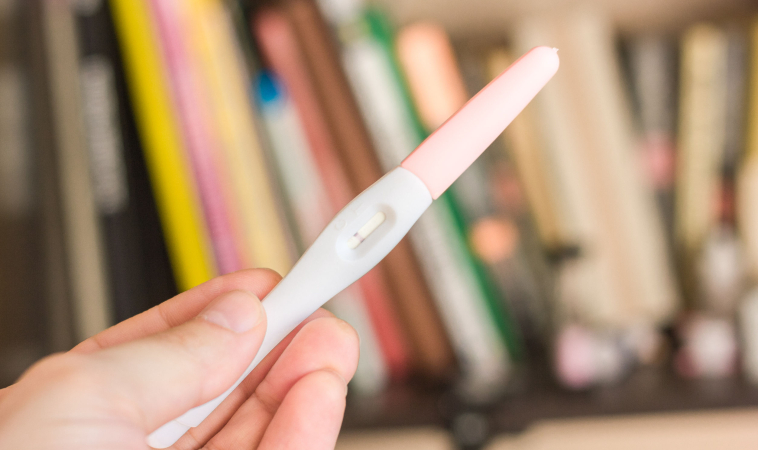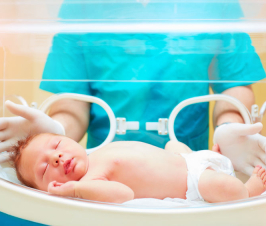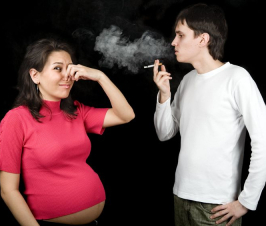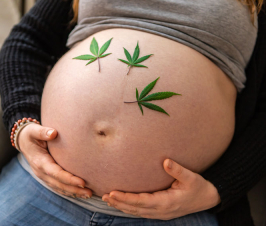Personal lubricants are commonly used for sexual comfort. For women it can help decrease the discomfort and pain associated with dyspareunia and can also be used to enhance sexual pleasure. There are several different brands and formulas available on the market today, from standard water-based lubricants, to those which offer warming or tingling sensations.
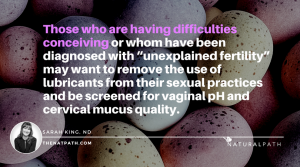 For couples who are attempting to conceive, however, these lubricants may impede sperm motility and may actually decrease the odds of implantation. Couples who are trying will often align intercourse with a woman’s ovulation, but they may also attempt to conceive in the days surrounding ovulation to increase their chances. These days, referred to as a woman’s fertile window can be accompanied by the presence of healthy cervical fluid to assist in sperm survival in addition to vaginal lubrication. However, not every day in the fertile window presents as such. Women may find they have drier days post-menstruation (lacking in “egg-white” cervical fluid) and may require an exogenous lubricant to prevent pain or discomfort.
For couples who are attempting to conceive, however, these lubricants may impede sperm motility and may actually decrease the odds of implantation. Couples who are trying will often align intercourse with a woman’s ovulation, but they may also attempt to conceive in the days surrounding ovulation to increase their chances. These days, referred to as a woman’s fertile window can be accompanied by the presence of healthy cervical fluid to assist in sperm survival in addition to vaginal lubrication. However, not every day in the fertile window presents as such. Women may find they have drier days post-menstruation (lacking in “egg-white” cervical fluid) and may require an exogenous lubricant to prevent pain or discomfort.
The use of these lubricants, as well as vaginal pH and abnormalities with cervical mucus, are all factors that can affect fertility.1 Those who are having difficulties conceiving or whom have been diagnosed with “unexplained fertility” may want to remove the use of lubricants from their sexual practices and be screened for vaginal pH and cervical mucus quality.
Natural lubricant patterns
A normal-cycling woman who regularly ovulates will show a particular pattern of cervical and vaginal fluid. Sometimes referred to as a type of discharge, the cervical fluid associated with ovulation has very distinct characteristics including its raw egg-white-like texture and colour. As well, it is often felt as slippery and has a visible stretch when plied between two fingers. This type of fluid is typically present for about 1-2 days, providing nourishment for sperm and helping keep them in position around the cervix so they have a better chance of making it into the uterus1.
This egg-white-quality fluid is extremely lubricating – so much so that couples often don’t need the assistance of an added commercial lubricant. However, the days surrounding ovulation may not lend the same lubricating fluids.
Outside of this window of the “perfect” ovulation and sperm-helping fluid we notice that vaginal fluids change from the end of menstruation to ovulation. First, a woman may have, what we refer to as drydays where the mucous membranes of the vaginal canal are still naturally lubricated to keep tissues moist and healthy (similar to the inside of your cheek), but there is a lack in additional lubrication. Women in this state may still experience dyspareunia as this type of moisture will evaporate within a few seconds of air exposure.
Alternatively, there may be days of watery, creamy, or sticky fluids, all of which may not be optimal for sperm survival, but they still allow to possibility of being fertile. With the fertile window extending up to 5-6 days before ovulation, couples may use these days as extra chances to become pregnant, even when vaginal and cervical fluids are not at their absolute optimal state. Any lack of lubrication may incline couples to use commercial lubricants to enhance the experience or help prevent discomfort.
The Effect of Commercial Personal Lubricants
As stated above, there are multiple types of commercially-available lubricants with varying ingredients that go beyond our general breakdown of water-basedand oil-based preparations. In fact, based on the formula, each lubricant will have its own pH, a factor that is crucial for sperm survival.
Studies have been carried out on individual brands and products to test the magnitude of the effect for each one
In general, all commercial lubricants will affect sperm motility, though studies have been carried out on individual brands and products to test the magnitude of the effect for each one. For example, one study looked at exposure to KY lubricants including Sensitive, Warming and Tinglingvarieties and found that each of these resulted in the immediate decline of both total and progressive sperm motility within 5 minutes.2
Sperm motility tested after exposure
Sperm motility has also been tested after exposure to Astroglide®, and Replens™ vaginal moisturizer. Both were shown to decrease sperm motility by 60-100% an hour after exposure compared to controls exposed to canola oil.3
Sperm motility and vitality analyzed in the following brands
Another study analyzed sperm motility and vitality when exposed to Conceive Plus®, Yes®, Sylk™, Forelife™, Preseed®, SAGE® Culture Oil, Johnson’s Baby Oil®, Media, and Maybe Baby® lubricants. Researchers found that sperm treated with these lubricants lead to vitality between 50-65%, with the exception of Conceive Plus®, which had a vitality of over 70%. Each of these preparations had a pH between 6.9 and 7.4, which is crucially important when sperm survival depends on a pH of 7-8.5.1 However, for the most part, ingredients within the formulas differed across the board.4
Motility was lowest in sperm exposed to these brands
Motility was lowest in sperm exposed to Sylk™ and Forelife™ with 31% and 47% respectively; and highest when exposed to Pre-seed® with over 85% motility. SAGE® Culture Oil and Johnson’s Baby Oil® both had the second highest progressive motility at just over 80% which was consistent with previous reports.4
Lubricants contain parabens, which are known endocrine disruptors
Though lubricants such as Conceive Plus® and Pre-seed® exhibit higher sperm motility and vitality compared to other lubricant brands, it should be noted that these products, in addition to Maybe Baby® and KY Jelly®, contain parabens, which are known endocrine disruptors. Therefore theoretically, women who either have hormonal dysfunction, or are at risk of genetically-linked hormonal disorders such as endometriosis or infertility may want to steer away from the use of these commercial lubricants.
Based on our current knowledge, couples looking to conceive are recommended to avoid lubricant use during the fertile window, however, they may still be used during the drier, infertile days of the menstrual cycle, when the pressure to conceive is off. This falls in the luteal phase, from post-ovulation until next menstruation. This would prevent any issue with natural sperm motility and viability when couples have the highest chance to conceive.
Conclusions
In the grand scheme of things, the above referenced studies have shed light on the effect that commercial lubricants have on sperm function. But a few things should be taken away from this research. The first is that we need more studies to dissect these formulas so that we can identify the specific compounds that negatively affect sperm function. By doing so, it may prompt the development of new formulas that are safer for sperm function. In particular, there have been conflicting reports regarding the effect of glycerol on sperm function.4
Research does not support the use of lubricants as a form of spermicide or birth control
Second, this research does not support the use of lubricants as a form of spermicide or birth control. Even with 30% motility, and 50% vitality, with the right conditions, pregnancy can still occur in couples who refrain from contraceptive use.
Take away
Lastly, our take away is that for couples who are trying to conceive, timing intercourse around ovulation, it would be prudent to avoid use of commercial lubricants with the exception of Conceive Plus® and Pre-seed®. Though even then, some women may wish to avoid the direct exposure of parabens with the vaginal mucosa and cervix.
References:
- Nakano, F.Y., Leao, R.F., Esteves, S.C. “Insights into the role of cervical mucus and vaginal pH in unexplained infertility” (2015) Medical Express Sao Paulo online. 2(2): http://dx.doi.org/10.5935/MedicalExpress.2015.02.07
- Sandhu, R.S., Wong, T.H., Kling, C.A., and Chohan, K.R. “In vitro effects of coital lubricants and synthetic and natural oils on sperm motility” (2014) Fertil Steril. 101(4): 941-4
- Kutteh, W.H., Chao, C.H., Ritter, J.O., and Byrd, W. “Vaginal lubricants for the infertile couple: effect on sperm activity” (1996) Int J Fertil Menopausal Stud.41(4): 400-4
- Mowat, A., Newton, C., Boothroyd, C, et al. “The effects of vaginal lubricants on sperm function: an in vitro analysis” (2014) J Assist Reprod Genet.31(3): 333-9
Image Copyright: <a href=’https://www.123rf.com/profile_sharafmaksumov’>sharafmaksumov / 123RF Stock Photo</a>
 Dr. Sarah King is a licensed Naturopathic Doctor, graduating from the Canadian College of Naturopathic Medicine in 2014. Prior to completing her medical studies, she attended Nipissing University where she received her Honors Bachelor of Science in Biology. Sarah has a passion for women’s health and is a birth doula in Durham and Toronto Region. She treats a wide variety of health conditions including menstrual disorders and hormone balancing, fertility, prenatal care, digestive concerns, skincare and mental health/anxiety. Outside the office Sarah is an avid runner with a love of the GTA’s best forest trails. She also continues to improve her yoga practice and teaches breath work as part of stress management counselling to her patients.
Dr. Sarah King is a licensed Naturopathic Doctor, graduating from the Canadian College of Naturopathic Medicine in 2014. Prior to completing her medical studies, she attended Nipissing University where she received her Honors Bachelor of Science in Biology. Sarah has a passion for women’s health and is a birth doula in Durham and Toronto Region. She treats a wide variety of health conditions including menstrual disorders and hormone balancing, fertility, prenatal care, digestive concerns, skincare and mental health/anxiety. Outside the office Sarah is an avid runner with a love of the GTA’s best forest trails. She also continues to improve her yoga practice and teaches breath work as part of stress management counselling to her patients.

